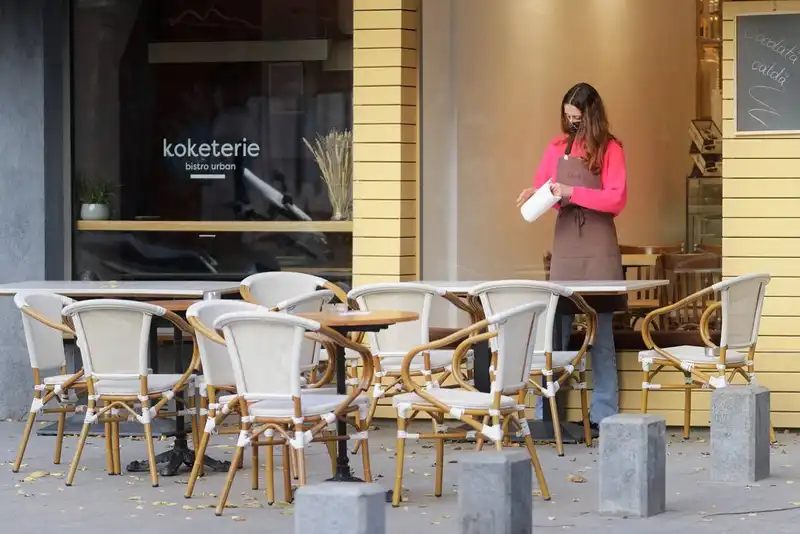How to Clean Up Your Restaurant- The Ultimate Guide to Restaurant Deep Cleaning
What is restaurant deep cleaning?
In restaurants, general cleaning activities are frequently included as part of the front-of-house side work. Cleaning tasks in this category include wiping down tables, sweeping or mopping floors, and keeping bathrooms clean. Deep cleaning is something that is done daily, but it is a three-step process. This includes thoroughly cleaning all surfaces. This first step is required for the following two steps to be as effective as possible. The next step is to use a disinfectant that is effective against viruses, mold, and fungus. Finally, using a sanitizing agent to reduce germs.
For restaurateurs, this three-step process can be time-consuming and intimidating, so it's best to hire a cleaning service or create an automated restaurant cleaning checklist. The latter can be accomplished using Zip Checklist, a team task management system that will not only remind your staff about the deep cleaning, but will also display a clear list of tasks assigned to team members and more.
Benefits of restaurant deep cleaning

According to US Food & Drugs, the federal government estimates that over 48 million cases of foodborne illness occur each year, infecting one out of every six Americans. These infections are projected to cause 128,000 hospitalizations and 3,000 deaths per year. Therefore, you, as a restaurant owner, certainly do not want to add to this number. Thus deep cleaning a restaurant can save not only lives, but also your business and reputation.
Here are a few more advantages of deep cleaning a restaurant-
It’s time for your restaurant deep cleaning. You know it needs to happen, but you don’t know where to start
This guide will walk you through every step of the process, from setting up your schedule to deep cleaning all of your surfaces
1. Prevents the spread of infectious disease
Making cleaning and sanitizing a part of your Restaurant Operations will help prevent infectious diseases like coronavirus, norovirus, and influenza from spreading among your employees and customers.
2. First impressions
Customers are likely to assume that the rest of your restaurant is dirty or unsanitary if the front-of-house sections appear to be dirty. Customers may abandon your business without even trying your food if they have a terrible first impression of an unsanitary environment.
3. Health inspections
Unsanitary preparation and service spaces can quickly become breeding grounds for dangerous pathogens, which no health inspector wants to witness. Cleaning and sanitizing your restaurant can help you avoid losing points on your next health inspection.
Cleaning up your restaurant can be a difficult and time-consuming task
This guide will walk you through the process of deep cleaning your restaurant so that you can enjoy your restaurant again!
4. Respect from employees
If you don't provide a safe, comfortable work environment for your employees, it may easily foster complacency, hostility, and a lack of respect for you and your company.
5. Cross-contamination
Contaminants can easily sneak into the food you're cooking and serving to consumers if your hoods aren't degreased or surfaces aren't swept for food particles.
Steps for restaurant deep cleaning

The secret to a clean restaurant is to take the proper steps. Here's how to deep clean your restaurant, step by step-
1. Preparation
To begin, make sure that all open food is covered. After that, assign cleaning crews to each location. With each team, go over the overview section and the checklist. Remind the teams that peroxide solution should never be mixed with other chemicals.
Keep important cleaning supplies like clean, dry cloth towels, two clean disinfectant buckets, two clean mop buckets, and plastic gloves ready to begin cleaning.
2. Clean and disinfect
To begin, wipe down surfaces with a clean, dry cotton towel. Second, disinfect the surface using a clean disinfectant cloth dipped in hydrogen peroxide/peroxyacetic acid or peroxide solution in a clean disinfectant bucket. Third, wipe the floors with a clean mop bucket filled with the same solution.
3. Wait
Depending on the disinfectant, you may need to wait anywhere from 2 to 10 minutes for the product to disinfect completely. Many hydrogen peroxide/peroxyacetic acid solutions require 2 minutes of contact time, while hydrogen peroxide and other solutions may require 5 minutes or more. Before rinsing, let the disinfectant rest for the required amount of time.
4. Thorough rinsing
Rinse the mop completely beforehand. Second, rinse the surface with a new/clean bucket filled with fresh/potable water and a new and dry cotton towel dipped in hot water. Mop the floors with a separate clean mop bucket filled with fresh/potable water.
5. Resanitize food contact areas before use
Once a comprehensive cleaning has been completed in food contact locations, make sure to rinse with potable water and sterilize with an EPA-registered food contact sanitizer before applying any food to that surface.
Restaurant deep cleaning checklist

Here's a Restaurant Cleaning checklist to help you go over every inch of your establishment. Remember the three stages as you progress from one place to the next- clean/disinfect, wait, and rinse.
1. Restaurant entrance and patio
Following the three-step method to clean-
- Push bars, locks, doors, and doorknobs (inside and out).
- Push bars or handles, as well as a patio gate and lock,
- Tables and chairs on the patio.
2. The front of the house
Clean, rinse, and disinfect the following-
- Utensils, bowls, trays, and other serving/eating utensils
- Countertops' tops and sides
- Displays and holders, stampers, staplers, business card holders, and tip jars
- POS printer and screens (do this with a very tightly wrung towel)
- Cash drawers
- Shelves and storage under the counter
- The interior and exterior of the beverage cooler
- Shelves and cabinets for food
- Phones
- Floor and floor drains
3. Dining room
Clean, rinse, and disinfect-
- Surfaces that customers may come into contact with, such as the customer side of the line, the sneeze guard, poles, and railings
- Menu coverings made of plastic should be sanitized
- Top, bottom, and armrests of chairs and highchairs
- All booths' seats and backs
- All booths' seats and backs
- All tables tops and sides
- All tables should be at least 6"-8" from the edge on the bottom/underside side.
- Corners, floors, and baseboards
4. Bathrooms
Clean/Disinfect, wait, and rinse-
- Inside and outside of all doors, including handles and knobs
- Mirrors
- Sinks and counter tops including faucets, handles, soap dispensers, and paper towel dispenser
- Hand-dryer
- Baby-changing stations
- Handles and surfaces
- Partitions, doors, latches, and hooks in toilet stalls
- Toilet paper dispensers
- Toilet and urinal surfaces
- Walls 24" from the ground to an average arm reach height
- Depositories for trash cans, coverings, and all feminine items
- Floor drains
5. Areas for dry storage
Following the three-step method to clean-
- All equipment base and electrical cord
- Box cutters
- Gloves that can withstand cuts
- Shelves
- Markers and holders for writing
- Carts that are utilized to transport and store food
- Each segment and container of the shelving unit- Remove all ingredients from each part of the shelf unit one at a time, using two cleaned, rinsed, and sanitized carts. Ensure that all containers are tightly closed before returning items to the shelving unit.
- Walls on the inside and exterior, including the fan and door
- Floor drains and the floor
6. Coolers with walk-in doors
Rinse, clean, and disinfect-
- Carts will be utilized to transport and store food.
- Each segment and container of the shelving unit- Remove all ingredients from each part of the shelf unit one at a time, using two cleaned, rinsed, and sanitized carts. Ensure that all containers are tightly closed before returning items to the shelving unit.
- Door curtains made of plastic (top to bottom)
- Walls on the inside and exterior, including the fan and door
- Focus on door handles between the back of the house and the front of the house
- Floor drains and floor
7. Food preparation area
Cleaning, rinsing, disinfecting, and sanitizing-
- Utensils (spatulas, spoons, cheese wire, bag openers, and measuring cups/spoons), knives and kitchen shears
- Knife storage racks
- All prep tables, including prep surfaces and the inside and outside of drawers
- The basin, faucet, handles, soap dispenser, and paper towel dispenser and hand washing sink
- Prep sink with basin, faucet, handles, and a drain latch
- Markers and holders for writing
- Food prep equipment and surfaces
- Surfaces on the food table, displays, display wall, baskets, including under-counter shelving, reach-in coolers
- Each segment and container of the shelving unit
- Walls on the inside and exterior, including the fan and door
- Focus on door handles between the back of the house and the front of the house
- Floor drains and floor
8. Ice machine area
Rinse, clean, and disinfect-
- Connectors and hoses (let air dry overnight before reattaching)
- Outside of ice machine
- Floor and floor drains
9. Dishwashing area
- Allow sinks to dry before washing dishes
- Pour Pot and Pan Detergent into the dishwashing sink. Use a proper disinfection solution, and rinse using freshwater.
- Floor drains and floors
10. Beverage and drink preparation stations
Follow the three-step method for-
- For inside and outside of the reach-in refrigerator
- Countertops' tops and sides
- Focus on the handles, plates, and temperature control knobs when it comes to equipment
- Ice Caddy both inside and out
- Wash utensils, ice scoops, and serving/eating items in the dishwashing room
- Shelves and storage under the counter
- Containers and holders for drink lids, straws, and other small items
- Soda machine's outside surfaces
- Outer surfaces of drinking station
11. Chemical area
Rinse, clean, and disinfect-
- Mop, broom, and floor squeegee handles
- Floor drains and floors
- Shelving and equipment
12. Office
- Phone, computer keyboard, calculator, and high-touch gadgets are all examples of high-touch devices. (clean these with a wrung-out towel)
- Everything on the desk, including the top and sides of the desk (including coffee makers, mugs, etc.)
- Both sides of the office door and doorknobs
- Floor drains and floor
Restaurant deep cleaning is a necessary evil
We’ve got you covered. Follow our step-by-step guide to make sure you get your restaurant as clean as possible


